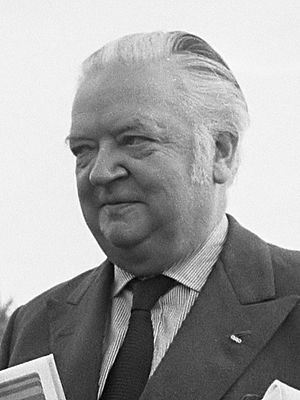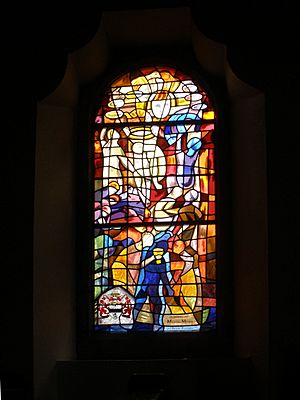Michael Morris, 3rd Baron Killanin facts for kids
Quick facts for kids
The Lord Killanin
MBE TD
|
|
|---|---|

Michael Morris, 3rd Baron Killanin in May 1976
|
|
|
|
| In office July 1927 – 25 April 1999 Hereditary peerage |
|
| Preceded by | The 2nd Baron Killanin |
| Succeeded by | The 4th Baron Killanin |
| 6th President of the International Olympic Committee | |
| In office 11 September 1972 – 3 August 1980 |
|
| Preceded by | Avery Brundage |
| Succeeded by | Juan Antonio Samaranch |
| Honorary President of the IOC | |
| In office 3 August 1980 – 25 April 1999 |
|
| Preceded by | vacant, last held by Avery Brundage (1975) |
| Succeeded by | vacant, next held by Juan Antonio Samaranch (2001) |
| Personal details | |
| Born | 30 July 1914 London, England |
| Died | 25 April 1999 (aged 84) Dublin, Ireland |
| Nationality | Irish |
| Spouse | Sheila Dunlop |
| Children | Redmond Monica Deborah Mouse John |
| Alma mater | Magdalene College, Cambridge |
| Occupation | Journalist, film producer, author, business executive, honorary consul |
Michael Morris, 3rd Baron Killanin (born July 30, 1914 – died April 25, 1999) was an important Irish figure. He was a journalist, an author, and a sports leader. He is best known for being the sixth President of the International Olympic Committee (IOC).
When he was just 12 years old, in 1927, he became a Baron. This meant he inherited a special title from his uncle. This title allowed him to join the House of Lords in the British Parliament when he turned 21.
Contents
Early Life and Education
Michael Morris was born in London, England. His father, George Morris, was an Irish soldier from Spiddal in County Galway. His family, the Morrises, were one of the famous "Tribes of Galway." Sadly, his father died in France during the First World War in 1914, just after Michael was born.
Michael's grandfather was the 1st Baron Killanin. He was a top judge in Ireland. Michael's mother, Dora Maryon Wesley Hall, was born in Australia. Her father was a manager of a gold mining company there.
School and Early Career
Michael went to several schools, including Eton College and the Sorbonne in Paris. He also studied at Magdalene College, Cambridge. While at Cambridge, he was the president of a drama club called Footlights.
In the mid-1930s, he started working as a journalist. He wrote for famous newspapers like the Daily Express and the Daily Mail. From 1937 to 1938, he worked as a war correspondent during the Second Sino-Japanese War. This meant he reported on the war from the front lines.
Military Service
In 1938, Michael Morris joined the British Army. He was part of a special unit that recruited other journalists, musicians, and actors. He became a major and helped plan important events during World War II.
He was involved in the planning of D-Day and the Battle of Normandy in 1944. These were huge military operations that helped end the war. For his service, he received an award called the Member of the Order of the British Empire (MBE). After the war, he moved to Ireland.
Family Life
In 1945, Lord Killanin married Sheila Cathcart Dunlop. She was from Oughterard, County Galway. Her grandfather, Henry Dunlop, built the famous Lansdowne Road Rugby Ground in Dublin.
Lord and Lady Killanin had three sons named George Redmond, Michael, and John. They also had a daughter named Monica Deborah.
Leading the Olympic Movement
Michael Morris became very involved in sports. In 1950, he became the head of the Olympic Council of Ireland. Two years later, in 1952, he became Ireland's representative in the International Olympic Committee (IOC).
Becoming IOC President
In 1968, he became a senior vice-president of the IOC. Then, in 1972, he was chosen to be the President of the IOC. He took over this important role after the 1972 Summer Olympics in Munich.
Challenges During His Presidency
His time as president was quite challenging for the Olympic Games.
- The 1976 Summer Olympics in Montreal faced big financial problems.
- The 1980 Summer Olympics in Moscow were boycotted by many countries. This meant many athletes did not attend.
Also, the city of Denver, which was supposed to host the 1976 Winter Olympics, decided not to. So, Innsbruck had to host instead. For the 1980 and 1984 Games, there weren't many cities wanting to host. So, Lake Placid and Los Angeles were chosen without much competition.
Lord Killanin stepped down as president in 1980, right after the Moscow Olympics. Juan Antonio Samaranch took over his position. Later, Lord Killanin was made the Honorary Life President of the IOC.
Other Important Roles
Lord Killanin held many other important positions throughout his life.
Business and Heritage
He was the Honorary Consul-General for Monaco in Ireland from 1961 to 1984. He also served as the Chairman of the Race Committee for Galway Racecourse for 15 years. He was a big fan of horse racing.
In his business life, he was a director for many companies, including Irish Shell and Ulster Bank. He also helped start An Taisce, which is like the National Trust for Ireland. He was the chairman of the National Monuments Advisory Council until he died.
Later Life and Legacy

Lord Killanin passed away at his home in Dublin when he was 84 years old. He was buried in his family's burial place in Bohermore Cemetery in Galway.
He left behind a legacy as a dedicated leader who guided the Olympic movement through a tough period.
Selected Books by Lord Killanin
Lord Killanin was also an author. Here are some of the books he wrote or helped create:
- Four days, an account of the 1938 Munich crisis (1938)
- Sir Godfrey Kneller & His Times (1948)
- Olympic Games (1976)
- Shell Guide to Ireland (1989)
- My Olympic Years (1983)
- My Ireland: A Personal Impression (1987)
Images for kids
| Civic offices | ||
|---|---|---|
| Preceded by |
President of the International Olympic Committee 1972–1980 |
Succeeded by |
| Peerage of the United Kingdom | ||
| Preceded by Martin Morris |
Baron Killanin 1927–1999 |
Succeeded by Red Morris |
See also
 In Spanish: Michael Morris Killanin para niños
In Spanish: Michael Morris Killanin para niños
 | Tommie Smith |
 | Simone Manuel |
 | Shani Davis |
 | Simone Biles |
 | Alice Coachman |


